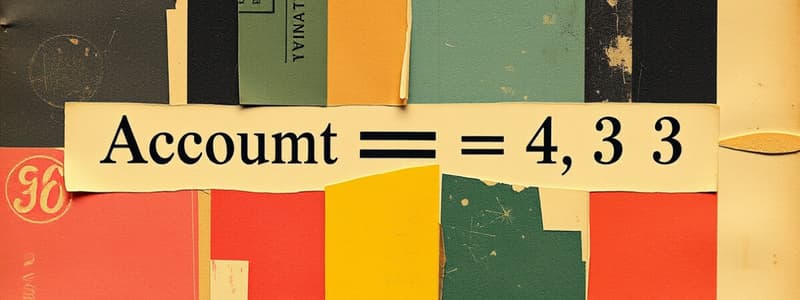Podcast
Questions and Answers
What does the accounting equation express?
What does the accounting equation express?
- The relationship between assets and how they are financed (correct)
- The relationship between an entity's revenue and expenses
- The relationship between cash inflows and outflows
- The total profit earned versus the total losses incurred
If an entity has $1,200,000 in assets and $750,000 in liabilities, what is the owner's equity?
If an entity has $1,200,000 in assets and $750,000 in liabilities, what is the owner's equity?
- $450,000 (correct)
- $750,000
- $1,950,000
- $2,000,000
Which of the following is a business transaction?
Which of the following is a business transaction?
- Withdrawing personal cash for a vacation
- Purchasing new office equipment (correct)
- Selling a personal car
- Receiving a gift from a friend
What is the effect of an owner providing $50,000 in cash to start a business?
What is the effect of an owner providing $50,000 in cash to start a business?
What defines a personal transaction?
What defines a personal transaction?
When a bank loan is secured to purchase a motor vehicle, which components of the accounting equation are affected?
When a bank loan is secured to purchase a motor vehicle, which components of the accounting equation are affected?
What effect does paying $3,500 towards a loan principal have on the accounting equation?
What effect does paying $3,500 towards a loan principal have on the accounting equation?
What is an example of a business event?
What is an example of a business event?
According to the accounting entity concept, which of the following should be recorded in the business's accounting system?
According to the accounting entity concept, which of the following should be recorded in the business's accounting system?
How does recording a $220 cash sale impact the accounting equation?
How does recording a $220 cash sale impact the accounting equation?
If liabilities amount to $300,000 and owners' equity is $200,000, what are the total assets?
If liabilities amount to $300,000 and owners' equity is $200,000, what are the total assets?
What is the impact of accrued wages of $990 on the accounting equation?
What is the impact of accrued wages of $990 on the accounting equation?
Which component does the accounting equation add for additional capital contributions?
Which component does the accounting equation add for additional capital contributions?
Which transaction would NOT be recorded in a business's accounting system?
Which transaction would NOT be recorded in a business's accounting system?
What happens to owner’s equity when an owner withdraws $5,000 for personal use?
What happens to owner’s equity when an owner withdraws $5,000 for personal use?
Which formula can be derived from the basic accounting equation?
Which formula can be derived from the basic accounting equation?
If a business purchases supplies on credit for $200, what effects will this transaction have?
If a business purchases supplies on credit for $200, what effects will this transaction have?
What must be kept separate from business transactions according to accounting principles?
What must be kept separate from business transactions according to accounting principles?
Which of the following describes the overall effect of income and additional capital on owner’s equity?
Which of the following describes the overall effect of income and additional capital on owner’s equity?
When using cash to purchase a laptop for $1,000, what is the accounting effect?
When using cash to purchase a laptop for $1,000, what is the accounting effect?
What is the primary purpose of source documents in the accounting cycle?
What is the primary purpose of source documents in the accounting cycle?
What must businesses ensure when preparing journal entries?
What must businesses ensure when preparing journal entries?
What does the process of journalising include?
What does the process of journalising include?
Which of the following statements accurately describes a ledger account?
Which of the following statements accurately describes a ledger account?
What does posting refer to in the accounting cycle?
What does posting refer to in the accounting cycle?
What is the main function of a trial balance?
What is the main function of a trial balance?
In the context of ledger accounts, what does a debit (Dr) balance indicate?
In the context of ledger accounts, what does a debit (Dr) balance indicate?
Which of the following is NOT a requirement for a complete journal entry?
Which of the following is NOT a requirement for a complete journal entry?
What primary information does a trial balance provide?
What primary information does a trial balance provide?
Which of these is an example of a source document?
Which of these is an example of a source document?
Study Notes
Understanding the Accounting Equation
- Basic accounting equation: Assets = Liabilities + Owner's Equity.
- Rearranged equation: Owner's Equity = Assets - Liabilities.
- Example: If assets total 960,000andliabilitiestotal960,000 and liabilities total 960,000andliabilitiestotal400,000, then owner's equity is $560,000.
Business Transactions, Personal Transactions, and Business Events
- Business Transactions: Exchanges impacting assets, liabilities, or equity, including:
- Capital contributions, wage payments, interest receipts, and goods sale.
- Personal Transactions: Transactions of owners unrelated to business operations; not recorded in accounting system.
- Business Events: Occurrences that may affect the entity but aren't recorded until an exchange happens.
- Accounting Entity Concept: Distinction between business and personal transactions is critical; only business transactions are recorded.
Transaction Analysis
- Maintain balance: Assets = Liabilities + Owner's Equity.
- Every transaction must affect the equation in at least two ways.
- Example Transactions:
- Owner’s investment increases both assets (cash) and equity (capital).
- Purchase of a vehicle increases assets (vehicle) and liabilities (loan).
- Loan repayment decreases both assets (cash) and liabilities (loan).
- Purchasing with cash affects one asset (increases computer) while decreasing another (decreases cash).
Extended Accounting Equation
- Expanded for income and expenses: Assets = Liabilities + Owner’s Equity + Income - Expenses.
- Income from sales increases assets (cash) and income.
- Accrued wages increase liabilities (wages payable) and expenses.
Fully Expanded Accounting Equation
- Includes additional capital contributions and owner’s drawings:
- Assets = Liabilities + Owner’s Equity + Income - Expenses + Additional Capital - Drawings*.
- Additional capital increases both assets (cash) and owner’s equity.
- Owner's drawings decrease both assets and equity.
Accounting Cycle
Step 1: Source Documents
- Evidence of transactions, essential for recording.
- Examples: EFT receipts, invoices, cash register records.
Step 2: Journal Entries
- Record transactions chronologically in the General Journal.
- Follow the double-entry system: each entry has a corresponding debit and credit.
- A complete journal entry includes date, accounts affected, amounts, and narration.
Step 3: The Ledger Account
- Records increases and decreases in specific accounts (assets, liabilities, equity, income, expenses).
- Cash at bank account shows all cash movements, indicating total cash on hand.
Posting
- Procedure of transferring journal entries to the ledger accounts.
- Involves documenting the amount, date, and corresponding accounts.
Step 4: The Trial Balance
- A list of accounts and balances at a specific point in time.
- Purpose: to verify that total debits equal total credits after posting.
- Helpful for identifying errors in journal entries or postings if debits and credits do not match.
Studying That Suits You
Use AI to generate personalized quizzes and flashcards to suit your learning preferences.
Description
Explore the fundamental concept of the accounting equation through this quiz. Understand how the relationship between assets, liabilities, and owners' equity forms the foundation of financial accounting. Test your knowledge with practical examples and scenarios.




